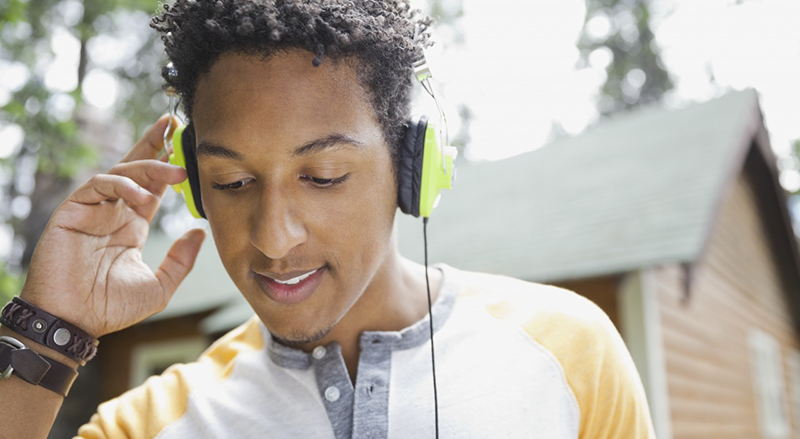Music Has the Power to Improve Your Health

Research shows music can reduce pain before and after surgery; it may help people with epilepsy, too.
A rock band gets an audience revved up with energy and dancing in the aisles. A love song stirs romantic emotions, and a lullaby helps soothe babies to sleep. Now scientists have found that music can do some unexpected things, too. It may produce a variety of unexpected health benefits.
For example, researchers from Brunel University and Queen Mary University of London analyzed 73 studies involving about 7,000 adult patients and concluded listening to music is good medicine for people undergoing surgery.
The research team compared the effects of listening to music to both standard medical care (including prescription drugs) or non-drug interventions like massage and the use of relaxation techniques for post-surgery pain. Patients who listened to music before, during, or after a surgical procedure had significantly less pain and anxiety. Their need for pain medication plummeted, too.
Listening to music at any time seemed effective, although there were slightly better outcomes if patients listened to music before their operations. Even listening to music while unconscious under general anesthesia reduced pain after operations — although the biggest drop in pain relief occurred when patients were awake while listening to music. In addition, if patients selected the music they liked, there was even less pain.
"Currently, music is not used routinely during surgery to help patients in their postoperative recovery,” said lead researcher Catherine Meads, MD, PhD, of Brunel University. “The lack of uptake is often down to the skepticism of professionals as to whether it genuinely works and, of course, issues of budget and the integration into daily practice. We hope this study will now shift misperceptions and highlight the positive impact music can have.”
Music also helps kids undergoing major surgery, according to a Northwestern University study. Approximately 60 pediatric patients between the ages of 9 and 14 who listened to about half an hour of any pop, country, rock, or classical music they liked had a significant reduction in pain after major surgery. Listening to short audio books helped with pain relief, too.
The researchers emphasized this is an important finding because controlling pain after surgery with medication can be problematic in children. That’s because the drugs most commonly used to treat post-operative pain, opioid analgesics, can cause breathing problems in kids. However, if the drugs are limited, then a younger’s pain is often not controlled. Music appears to be a way to reduce pain without the use of high-dose medication.
“Audio therapy is an exciting opportunity and should be considered by hospitals as an important strategy to minimize pain in children undergoing major surgery,” said lead researcher Santhanam Suresh, MD, professor of anesthesiology and pediatrics at Northwestern University Feinberg School of Medicine. “This is inexpensive and doesn’t have any side effects.”
Researchers from the University of Alberta have also found that that music lessens children's perceived sense of pain when they undergo non-surgical procedures, too.
For the study, 42 children between the ages of three and 11 who were treated in a pediatric emergency department were observed to see if those who listened to music while getting an IV had less pain compared to those who didn’t have music provided.
The researchers measured the children's level of distress by recording the young patients’ heart rates. They also asked the youngsters, their parents, and the healthcare providers who administered the IVs about the children’s pain. The youngsters who listened to music showed significantly less distress and appeared to be in less pain. IVs were far easier to administer to the kids listening to music, too.
"The finding is clinically important and it's a simple intervention that can make a big difference. Playing music for kids during painful medical procedures would be an inexpensive and easy-to-use intervention in clinical settings," said lead researcher Lisa Hartling, PhD, an associate professor of pediatrics at the University of Alberta.
Music may also help reduce seizures. Research presented at the recent American Psychological Association's 123rd Annual Convention, revealed that the brains of people with epilepsy seem to react to music differently than the brains of people who are seizure-free.
"We believe that music could potentially be used as an intervention to help people with epilepsy," said Christine Charyton, PhD, a professor of neurology at the Ohio State University Wexner Medical Center, who presented the research.
It turns out that music is processed through the auditory cortex — the same region of the brain where 80 percent of temporal lobe epileptic seizures appear to originate. Charyton and her colleagues recorded and studied brainwave patterns while seizure patients sat through several alternating 10 minute periods of silence followed by listening to either Mozart or John Coltrane music.
The research team found significantly higher levels of brainwave activity in participants while music was playing. What’s more, the temporal lobe brainwave activity in people with epilepsy tended to synchronize more with music when compared to brainwave activity in people without epilepsy who listened to music.
"We were surprised by the findings," said Charyton. "We hypothesized that music would be processed in the brain differently than silence. We did not know if this would be the same or different for people with epilepsy."
The research suggests music might work in conjunction with traditional medical treatments to help prevent seizures in those with epilepsy, according to Charyton.
Updated:
March 31, 2020
Reviewed By:
Janet O’Dell, RN